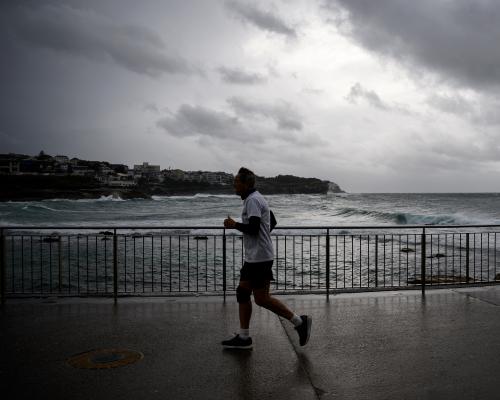
Lincoln* calls his firearm prohibition order (FPO) a “lifetime punishment”.
It was placed on him after he left prison, and Lincoln says it made it difficult to feel as if he had a fresh start.
Even when dating a new partner, he had to have a difficult conversation: that anywhere they went – at home or even in a car – he could be searched by police without a warrant due to the FPO.
“I’d been studying and working, doing all that kind of stuff, but still had that fear that at any minute they could come through the door,” Lincoln, who lives in Sydney, says.
Weapon and firearm prohibition orders, which never expire, can be made if police deem that someone is not fit, in the public interest, to possess a firearm or weapon.
Thousands of people in New South Wales are living under these orders – some as young as 14, others in their 80s and 90s.
A Guardian Australia report in May revealed FPOs are disproportionately placed on Aboriginal or Torres Strait Islander people. The majority of under-18s served with a FPO identified as Aboriginal.
New data obtained from NSW police shows similar results for weapon prohibition orders (WPOs), which are often served simultaneously: of the 78 people served with a WPO under age 18, 55% identified as Aboriginal or Torres Strait Islander.
About 51% of the 4,267 people in NSW with WPOs identify as Aboriginal or Torres Strait Islander – a “concerning level of over-representation”, according to Jonathan Hall Spence, the principal solicitor with the Justice and Equity Centre.
In response to questions from Guardian Australia, NSW police pointed to recent amendments to the procedures that govern FPOs and WPOs, including an independent review of any applications of FPOs for those under 18 by the commander of the firearms registry and an internal review of adult FPOs every five years.
A debt after sentence served
Timothy Roberts, the president of the NSW Council for Civil Liberties, said the FPO and WPO regime is an example of how the criminal justice system is increasingly being used punitively rather than for helping people rebuild or change.
“You’ve got a situation here where someone can walk out the door of a prison sentence that would serve their debt to the community, but then the police at their own discretion create a debt of their own,” he said.
Claude Robinson knows more about this than most.
At Rainbow Lodge in Sydney, Robinson helps men who have recently left prison get back on their feet.
The long-running residential support program assists all sorts of people, but he’s recently had to make a new rule: men with weapon and firearm prohibition orders can no longer stay there.
Robinson’s particular worry is how police deliver these orders. The first time someone was served with a FPO at the lodge, police called ahead, Robinson says.
The next time, it was different: police came early in the morning with masks and weapons with no warning and pulled the man out in his underwear. Robinson says they served the order and searched the man’s room, finding nothing.
His program tries to teach men that if you behave in what Robinson calls “a pro-social way”, that the criminal justice system becomes irrelevant to your life.
A show of force like this risks undoing the work of the program for everyone staying there, he says, and that’s why men with these orders can no longer stay at the lodge – cutting off an important rehabilitative opportunity.
“The police turn up here in riot gear and … undo what it’s taken us three months to get people to believe in 10 minutes,” Robinson says.
Legal doubts and questions
FPOs and WPOs are applied at police discretion – not by a court. There is no requirement that the person committed a firearm or weapon-related offence.
Alongside criminal history or gang associations, police can consider factors such as traffic infringements that demonstrate “a general disregard for the law” when considering whether to make an FPO, according to NSW police standard operating procedures obtained by Guardian Australia.
While both FPOs and WPOs do not expire, the latter cannot be appealed to the NSW Civil and Administrative Tribunal (NCAT) – a situation affirmed in a 2020 decision before the tribunal.
In his NCAT findings, Geoffrey Walker, a University of Queensland emeritus professor, remarked on submissions that argued “most Australians would consider it unfair that a person should remain subject to a WPO, with its concomitant liability to warrantless search and seizure … long after the circumstances that caused the commissioner to form the opinion … had ceased to exist.”
The FPO scheme’s enhanced search powers mean police can search someone with an FPO or their premises or car at any time, “as reasonably required”, to determine if they have committed an offence by having a firearm, firearm parts or ammunition.
While they were introduced in 2013 to combat gun crime, legal advocates have raised questions about the efficacy of FPO search powers, and whether they’re being used as a surveillance tool rather than gun control.
In 2023-24, police found firearms or firearm accessories in only 1.36% of 8,651 searches. The year before, there were only nine occasions when a firearm-related item was found out of 9,731 searches.
According to the police FPO procedures, if police find other illegal items during a search, they must identify another legal authority to seize them.
Brendan*, a former resident at Rainbow Lodge, didn’t know what an FPO or WPO involved when he first received them from police.
When he understood the FPO meant anywhere he went could be searched without notice, he stopped socialising out of concern that he would inadvertently bring police to the doors of friends and family.
It’s hard to move on when “that’s hanging over our head all the time”, Brendan says. “[I’m] on edge all the time, waiting [for them] to bang on the door.”
‘Carte blanche’ search powers
Both Lincoln and Brendan agree that they can see the purpose of something like an FPO if someone has committed a violent offence using a firearm, but are frustrated these orders are not decided in court.
Typically, no lawyers are present when they’re served.
Robinson is also worried about the impact of these orders and what he calls the “carte blanche” of FPO search powers on men trying to rebuild their lives after prison.
“It continues that negative relationship that the men who come here have with the police and [the belief] police do treat them differently,” Robinson says.
“That window of change where things need to get better is small and this doesn’t help them.”
Lincoln served the time that Australia’s justice system decided was his punishment, but now he feels he has another never-expiring penalty hanging over him.
“You’re saying, I want to be a completely different person with a different friend group and different work … but I’m also hiding this secret that ties me to a life I used to have and means that I’m different to everyone else.
“It’s painful and I don’t think it’s fair.”
* First names only used for privacy reasons.







